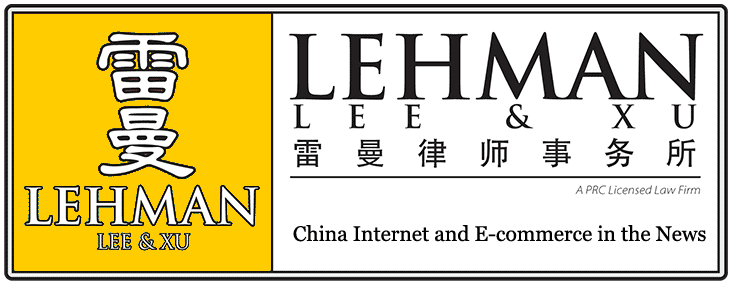

 |
|
LEHMAN, LEE & XU China Lawyers
|
|
China Internet and E-commerce In The News
|
|
April 29, 2014
|
The China Law News keeps you on top of business, economic and political events in the China. |
|
|
|
In the News |
Alibaba tests the limits of China¡¯s non-bank banking |
Alibaba isn¡¯t a bank. But for customers it¡¯s getting hard to tell the difference. Users of China¡¯s dominant e-commerce website can now deposit funds, make investments, take out loans and even give out gifts of virtual cash. In taking on China¡¯s lenders, Alibaba and its online rivals may be taking on bank-like risk. Banks typically offer savings, loans and transactions. Alibaba¡¯s foray into finance has seen it target all three. While the amounts remain small compared with China¡¯s towering mainstream lenders, the growth rates have been rapid. No wonder: state-owned banks have for years benefited from a tightly-regulated oligopoly. Alibaba has long handled payments through Alipay, its version of PayPal. Now it allows users to invest surplus cash through a service called Yu E Bao. The funds, which are invested in low-risk securities like government bonds and interbank loans, offer a return of about 6 percent, double what savers get on one-year bank deposits. It¡¯s a money market fund, not a bank deposit. But for customers there is little substantive difference. Alibaba is now getting into longer-term investments. A fixed-term product launched through Yu E Bao on Friday would give customers an expected 7 percent yield, by investing in property and equities among other things. The clever part is that Alibaba isn¡¯t doing the financial heavy lifting. Yu E Bao and the new fixed-term product are structured and operated by third parties. The e-commerce group acts as a conduit. Alibaba isn¡¯t technically on the hook for users¡¯ cash, nor does it pick investments, according to a person familiar with the situation.
But Alibaba is straying into a grey area. China¡¯s immature financial industry still hasn¡¯t been through decisive tests of who takes responsibility when investments go wrong. For Alibaba, this risk may be heightened. Its users are young and financially unsavvy ? Yu E Bao savers have an average age of around 28 ? and trust for Alibaba¡¯s brands runs high, thanks partly to founder Jack Ma¡¯s self-styling as a champion of the little guy. Even if Alibaba has no explicit responsibility to pay back investors, it may decide to do so to protect its reputation. The situation with Yu E Bao is further complicated by the fact Alibaba owns 51 percent of Tianhong, the fund management company that structures the products. For now, Alibaba and its online rivals are more of an annoyance for banks than a real threat. But while Alibaba is decidedly not a bank, the biggest risk is that customers treat it like one. If that happens, it¡¯s a fair bet regulators will too. Source: http://www.shanghaidaily.com/Opinion/biz-commentary/Alibaba-tests-the-limits-of-Chinas-nonbank-banking/shdaily.shtml |
China jails blogger in 'rumour' crackdown |
Beijing - A Chinese court jailed a blogger for three years on Thursday, state media reported, the first person to be sentenced in a government-led crackdown on so-called internet rumours.
|
|
|
|
|
| Proud Member of |